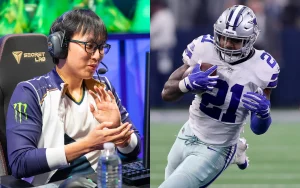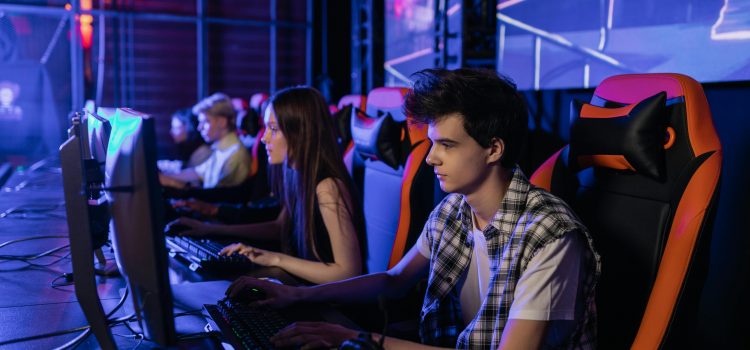
Introduction
Esports (electronic sports) has become a huge part of modern entertainment, especially for young people. What was once a hobby for a small group of gamers has turned into a global industry. Today, esports is not only about playing video games; it’s about professional competitions, sponsorships, and millions of fans. As the gaming world grows, esports has become deeply woven into youth culture, shaping the way young people spend their time, interact with others, and even build careers.
This article will dive into the rise of esports, how it has become so popular among youth, and what its impact is on their culture.
The Rise of Esports

Esports has become extremely popular over the past few years. Games like League of Legends, Fortnite, and Call of Duty have brought competitive gaming into the spotlight. Thanks to better internet speeds, affordable gaming consoles, and streaming platforms like Twitch, it’s easier than ever for people to play and watch games online.
Esports competitions have grown in size, with massive tournaments offering huge prizes. This growth is not just about the games themselves; it’s also about the fans. In 2026, the esports industry is expected to earn over $1.5 billion, showing how much the gaming world has evolved.
Esports as a Career

One of the main reasons esports has become so important in youth culture is that it offers new career opportunities. Professional gamers can make money through sponsorships, tournament wins, and streaming. This has attracted a new generation of young people who now see gaming as a way to make a living.
Besides playing, other jobs in esports have become popular, like coaching, broadcasting, and content creation. As the industry keeps growing, the number of esports-related careers will continue to increase.
Socializing Through Esports

A big reason why esports is so popular is its ability to bring people together. Online multiplayer games let people from different parts of the world compete against each other. This creates strong communities of players who share the same passion.
Many esports teams have large fan bases, and the players themselves are seen as role models. Social media platforms like Instagram and Twitter make it easy for players to connect with fans and create a closer relationship with them. Esports events like the League of Legends World Championship bring fans together in arenas and online, turning the competition into a global celebration.
Building Identities Through Esports

Esports offers young people a way to build their identities. For many, gaming isn’t just a hobby – it’s a way of expressing themselves. Whether it’s through their gaming skills or their online persona, esports gives players a chance to be recognized and feel valued.
Some young people find that being part of the esports community helps them define who they are. It gives them a sense of purpose and a way to connect with others who have similar interests.
Esports vs. Traditional Sports

Esports is not just a form of entertainment; it’s starting to affect traditional sports. Many of the skills used in esports, like teamwork, strategy, and communication, are also used in physical sports. This has led to more partnerships between esports and traditional sports organizations, with sports teams even starting their own esports teams.
Esports has also introduced competitive gaming to a younger audience who may not be interested in physical sports. In a way, esports is creating a new type of sport that attracts those who enjoy mental challenges more than physical ones.
Esports as a Social Experience

One of the main reasons esports is so popular among young people is because it allows them to connect with others. Online multiplayer games let players from all around the world compete together. Whether it’s chatting with friends while playing or joining a team, esports provides a way for young people to form relationships. They share the excitement of winning, the disappointment of losing, and the thrill of competing in big tournaments. For many, it’s not just about the game but about the people they meet along the way.
The Growth of Esports Communities
Esports has led to the rise of large, passionate communities. Fans of specific games, players, or teams often come together to cheer for their favorites, share tips, and discuss strategies. These communities can be found both online and in person, with social media platforms and forums giving fans a space to interact. Esports events, like live tournaments and streaming on platforms like Twitch, have turned into events where fans gather to enjoy the action and show their support. The sense of belonging that comes with being part of these communities is a big reason why esports is so attractive to young people.
The Role of Streaming in Esports

Streaming has played a huge part in the rise of esports. Platforms like Twitch and YouTube have made it easy for gamers to stream their gameplay live, giving fans a chance to watch professional gamers in action. This has turned esports competitions into major events, where thousands, or even millions, of people tune in to watch. These streams often come with live commentary, making the experience more exciting and engaging for viewers. For many young people, watching esports on these platforms has become a regular form of entertainment.
Esports and Education
Esports is not only about entertainment; it also plays a role in education. Many schools and universities have started offering esports programs, where students can participate in teams and even earn scholarships. These programs teach students valuable skills like teamwork, leadership, and time management, which are useful both in gaming and in life. Some schools even have esports arenas, where students can practice and compete. The rise of esports in education shows how gaming is becoming more than just a hobby; it’s a serious activity that can help shape future careers.
The Influence of Esports on Traditional Sports

Esports has also started influencing traditional sports. Many professional sports teams, like football and basketball clubs, have started their own esports teams. These teams compete in video game versions of real sports, such as FIFA or NBA 2K. This partnership between esports and traditional sports shows how gaming is becoming an important part of the sports world. It also allows sports fans who may not be into traditional sports to enjoy a new form of competition. Esports is slowly changing how we think about sports in general.
Esports in Popular Culture
Esports has made its way into mainstream popular culture. It’s no longer just a niche interest; it’s part of the larger entertainment world. Esports tournaments are broadcast on major TV networks, and popular athletes and celebrities are joining in on the action. Big brands and companies are also sponsoring esports events and players, helping to make the industry even bigger. As esports continues to grow, its influence on music, movies, and television will likely increase, making it a bigger part of youth culture than ever before.
Esports as a Gateway to Other Opportunities

Esports can open doors to many other opportunities for young people. Beyond becoming a professional gamer, there are many jobs related to esports, such as coaching, event management, broadcasting, and content creation. As the esports industry grows, new career paths are emerging, and young people can find jobs that combine their passion for gaming with other skills. For example, some gamers use their online platforms to create videos, while others work as commentators or analysts at esports events. With the rise of esports, the number of job opportunities in this field continues to grow, providing a bright future for those interested in the gaming industry.
Challenges in the Esports World
While esports brings many benefits, there are also some concerns. One issue is gaming addiction. Because competitive gaming requires so much time and focus, it can lead to players spending too many hours on their computers, neglecting schoolwork, friends, and family.
Another problem is the pressure that young gamers face to perform well. Professional gamers often start their careers in their teens, and the stress of competing in tournaments can lead to burnout or mental health struggles.
Also, esports is still mostly male-dominated, with fewer opportunities for women and other underrepresented groups. While efforts are being made to make esports more inclusive, there’s still much work to be done.
The Future of Esports

The future of esports looks bright. As technology improves, the gaming experience will only get better. Virtual reality, faster internet, and more advanced gaming systems will continue to change how people play and watch esports. The esports industry is expected to keep growing, bringing in more fans and new career paths for young people. There will also be more focus on making esports more inclusive, offering opportunities for all kinds of players. With the support of sponsors, sports organizations, and the global gaming community, esports will remain a key part of youth culture for years to come.
Analysis Table: The Growth of Esports in Youth Culture
| Factor | Impact on Youth Culture | Key Influences |
|---|---|---|
| Technological Advances | Easier access to online gaming and better experiences | Faster internet, improved gaming consoles, streaming services |
| Career Opportunities | Gaming offers a chance for young people to make money | Sponsorships, professional teams, content creation |
| Social Interaction | Esports allows young people to connect with others | Online games, esports teams, global tournaments |
| Youth Identity | Esports helps young people define who they are | Personal gaming skills, building online personas |
| Traditional Sports | Esports is attracting people who may not be interested in traditional sports | Shared strategies, new competitive formats |
Comparative Table: Esports vs Traditional Sports in Youth Culture
| Aspect | Esports | Traditional Sports |
|---|---|---|
| Popularity | Quickly growing, especially among younger audiences | Long-established and widely popular |
| Career Opportunities | Pro gamers, coaches, broadcasters, streamers | Pro athletes, coaches, team staff |
| Accessibility | Can be played anywhere with an internet connection | Requires physical space, equipment, and training |
| Global Reach | Tournaments and players can reach a global audience | Mostly local or regional, global events are less frequent |
| Physical Activity | Low physical activity, focus on strategy and skills | Requires physical activity and fitness |
Conclusion
Esports is no longer just a hobby for a small group of gamers; it’s a global industry and a major part of youth culture. With its growing popularity, esports offers career opportunities, global communities, and a space for young people to express themselves. While there are challenges, like addiction and the need for more inclusivity, esports continues to shape the future of youth entertainment and sports.
As technology continues to advance and the industry grows, esports will remain an important part of the lives of many young people, influencing the way they play, work, and socialize.










